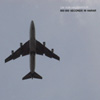 This extremely minimalist album of high-concept drone was composed as the soundtrack for a Michael Azar play about the life of one of the most iconic tortured artists in history: poet Arthur Rimbaud.  The actual music seems to have been secondary to the cleverness, veracity, and thematic consistency of the process, which I find both problematic and intriguing. That particular aesthetic often makes for an underwhelming and difficult listening experience, but Harar can sometimes be perversely mesmerizing in its simplicity too.
This extremely minimalist album of high-concept drone was composed as the soundtrack for a Michael Azar play about the life of one of the most iconic tortured artists in history: poet Arthur Rimbaud.  The actual music seems to have been secondary to the cleverness, veracity, and thematic consistency of the process, which I find both problematic and intriguing. That particular aesthetic often makes for an underwhelming and difficult listening experience, but Harar can sometimes be perversely mesmerizing in its simplicity too.
This album takes its title from the fact that Hausswolff spent ten days in the Ethiopian city of Harar gathering the source material, a place where Rimbaud spent the final years of his life as gun-runner and coffee trader.  Notably, the sounds that Hausswolff decided to capture and incorporate to his music are fairly abstract and a little perplexing.  For example, the backbone of the album's centerpiece, the three-part epic "Day and Night" is comprised of drones made on a krar that he bought after several days of searching.  However, he very quickly realized that he could not effectively play his new stringed instrument, so he opted to use a bow to get a good droning single tone and then heavily processed it with his computer.
He also made some field recordings, some of crickets, gentle breezes, and distant children's voices taken from a hillside (which appear on "Day") and some less ambitious ones of his hotel faucet dripping (which appear on "Night").  That is essentially it.  Musically, that translates into the first 14 minutes of the album being devoted to a single subtly wavering note or chord with some quiet natural ambient sounds around it.  Such extreme stasis is difficult to get very enthusiastic about, but waiting for something to happen for so long is deliciously tense and makes the transition into the lengthy third section ("Alas!") extremely powerful simply because the damn note changed.  Thankfully, things also get a bit dark, unsettling, and complexly multi-layered at that point (though they are still largely centered around a one-chord drone).  After several listens, I've ultimately decided that I like the entire piece quite a bit, but it demands an enormous amount of patience and attention to nuance to appreciate it enough to make it to the pay-off.
Unfortunately, the album's closing piece, the 13-minute "The Sleeper in the Valley," is not nearly as successful.  Hausswolff abandons his krar and opts instead for several oscillators droning away in uncomfortably dissonant harmony.  The twist is that there is a low-frequency oscillator in the mix that is transmitting the words to Rimbaud's "Le Dormeur Du Val" in Morse code, which is entirely too cerebral/"high art" for me (in fact, I think I simultaneously cringed and grimaced when I learned that).  Such a move wouldn't be nearly as irksome if the piece held up musically, but it is basically just a somewhat annoying buzz with an erratic pulse thrown in.  I definitely wish the album had ended after "Night and Day."
On one hand, it seems unfair to disparage something intended as a soundtrack for not being particularly compelling on its own.  On the other hand, however, this has been released as a stand-alone album and it needs to be judged as such. Additionally, it drives me crazy when great art or a fascinating life are co-opted into something that is neither particularly great nor fascinating.  Rimbaud was a very singular, brilliant, and passionate guy: 800,000 Seconds in Harar is at best a better-than-average drone album (and at its worst, an exasperating exercise in bloodless over-intellectualism).
Samples:
 
Read More


